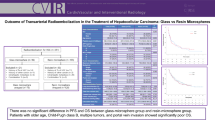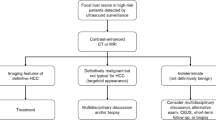Abstract
Objectives
Hepatic arterial infusion chemotherapy (HAIC) using the FOLFOX regimen (oxaliplatin plus fluorouracil and leucovorin) is a promising option for advanced hepatocellular carcinoma (Ad-HCC). As identifying patients with Ad-HCC who would obtain objective response (OR) to HAIC preoperatively remains a challenge, we aimed to develop an automatic and non-invasive model for predicting HAIC response.
Methods
A total of 458 patients with Ad-HCC who underwent HAIC were retrospectively included from three hospitals (310 for training, 77 for internal validation, and 71 for external validation). The deep learning and radiomic features were extracted from the automatically segmented liver region on contrast-enhanced computed tomography images. Then, a deep learning radiomic nomogram (DLRN) was constructed by integrating deep learning scores, radiomic scores, and significant clinical variables with multivariate logistic regression. Model performance was assessed by AUC and Kaplan-Meier estimator.
Results
After automatic segmentation, only a few modifications were needed (less than 30 min for 458 patients). The DLRN achieved an AUC of 0.988 in the training cohort, 0.915 in the internal validation cohort, and 0.896 in the external validation cohort, respectively, outperforming other models in HAIC response prediction. Moreover, survival risk stratification was also successfully performed by the DLRN. The overall survival (OS) of the predictive OR group was significantly longer than that of the predictive non-OR group (median OS: 26.0 vs. 12.3 months, p < 0.001).
Conclusions
The DLRN provided a satisfactory performance for predicting HAIC response, which is essential to identify Ad-HCC patients for HAIC and may potentially benefit personalized pre-treatment decision-making.
Clinical relevance statement
This study presents an accurate and automatic method for predicting response to hepatic arterial infusion chemotherapy in patients with advanced hepatocellular carcinoma, and therefore help in defining the best candidates for this treatment.
Key Points
• Deep learning radiomic nomogram (DLRN) based on automatic segmentation of CECT can accurately predict hepatic arterial infusion chemotherapy (HAIC) response of advanced HCC patients.
• The proposed prediction model can perform survival risk stratification and is an easy-to-use tool for personalized pre-treatment decision-making for advanced HCC patients.






Similar content being viewed by others
Abbreviations
- Ad-HCC:
-
Advanced hepatocellular carcinoma
- AP:
-
Arterial phase
- APE:
-
Arterial peritumoral enhancement
- CECT:
-
Contrast-enhanced computed tomography
- DLRN:
-
Deep learning radiomic nomogram
- FCNN:
-
Fully connected neural network
- FOLFOX:
-
Oxaliplatin plus fluorouracil and leucovorin
- HAIC:
-
Hepatic arterial infusion chemotherapy
- LASSO:
-
Least absolute shrinkage and selection operator
- mRECIST:
-
Modified Response Evaluation Criteria in Solid Tumors
- OR:
-
Objective response
- OS:
-
Overall survival
- PP:
-
Portal phase
- ROC:
-
Receiver operating characteristic
- ROI:
-
Region of interest
- RVI:
-
Radiogenomic venous invasion
- TKIs:
-
Tyrosine kinase inhibitors
References
Miller KD, Goding Sauer A, Ortiz AP et al (2018) Cancer statistics for Hispanics/Latinos, 2018. CA Cancer J Clin 6:425–445
Villanueva A (2019) Hepatocellular carcinoma. N Engl J Med 15:1450–1462
Sung H, Ferlay J, Siegel RL et al (2021) Global Cancer Statistics 2020: GLOBOCAN estimates of incidence and mortality worldwide for 36 cancers in 185 countries. CA Cancer J Clin 3:209–249
Pinter M, Scheiner B, Peck-Radosavljevic M (2021) Immunotherapy for advanced hepatocellular carcinoma: a focus on special subgroups. Gut 1:204–214
Kudo M, Finn RS, Qin S et al (2018) Lenvatinib versus sorafenib in first-line treatment of patients with unresectable hepatocellular carcinoma: a randomised phase 3 non-inferiority trial. Lancet 10126:1163–1173
Zhu AX, Kang YK, Yen CJ et al (2019) Ramucirumab after sorafenib in patients with advanced hepatocellular carcinoma and increased alpha-fetoprotein concentrations (REACH-2): a randomised, double-blind, placebo-controlled, phase 3 trial. Lancet Oncol 2:282–296
Copur MS (2008) Sorafenib in advanced hepatocellular carcinoma. N Engl J Med 23:2498; author reply 2498–9
Kim TS, Kim JH, Kim BH et al (2017) Complete response of advanced hepatocellular carcinoma to sorafenib: another case and a comprehensive review. Clin Mol Hepatol 4:340–346
Han KH (2018) Treatment of hepatocellular carcinoma with lenvatinib. Gastroenterol Hepatol (N Y) 11:662–664
Ikeda M, Shimizu S, Sato T et al (2016) Sorafenib plus hepatic arterial infusion chemotherapy with cisplatin versus sorafenib for advanced hepatocellular carcinoma: randomized phase II trial. Ann Oncol 11:2090–2096
Lyu N, Kong Y, Mu L et al (2018) Hepatic arterial infusion of oxaliplatin plus fluorouracil/leucovorin vs. sorafenib for advanced hepatocellular carcinoma. J Hepatol 1:60–69
Choi JH, Chung WJ, Bae SH et al (2018) Randomized, prospective, comparative study on the effects and safety of sorafenib vs. hepatic arterial infusion chemotherapy in patients with advanced hepatocellular carcinoma with portal vein tumor thrombosis. Cancer Chemother Pharmacol 3:469–478
He M, Li Q, Zou R et al (2019) Sorafenib plus hepatic arterial infusion of oxaliplatin, fluorouracil, and leucovorin vs sorafenib alone for hepatocellular carcinoma with portal vein invasion: a randomized clinical trial. JAMA Oncol 7:953–960
Li QJ, He MK, Chen HW et al (2022) Hepatic arterial infusion of oxaliplatin, fluorouracil, and leucovorin versus transarterial chemoembolization for large hepatocellular carcinoma: a randomized phase III trial. J Clin Oncol 2:150–160
Wen P, Chen SD, Wang JR, Zeng YH (2019) Comparison of treatment response and survival profiles between drug-eluting bead transarterial chemoembolization and conventional transarterial chemoembolization in Chinese hepatocellular carcinoma patients: a prospective cohort study. Oncol Res 5:583–592
Chen M, Cao J, Hu J et al (2021) Clinical-radiomic analysis for pretreatment prediction of objective response to first transarterial chemoembolization in hepatocellular carcinoma. Liver Cancer 1:38–51
Miyaki D, Kawaoka T, Aikata H et al (2015) Evaluation of early response to hepatic arterial infusion chemotherapy in patients with advanced hepatocellular carcinoma using the combination of response evaluation criteria in solid tumors and tumor markers. J Gastroenterol Hepatol 4:726–732
Hatooka M, Kawaoka T, Aikata H et al (2018) Hepatic arterial infusion chemotherapy followed by sorafenib in patients with advanced hepatocellular carcinoma (HICS 55): an open label, non-comparative, phase II trial. BMC Cancer 1:633
Yamamoto S, Onishi H, Takaki A et al (2020) The early decline of alpha-fetoprotein and des-gamma-carboxy prothrombin predicts the response of hepatic arterial infusion chemotherapy in hepatocellular carcinoma patients. Gastrointest Tumors 3:83–92
Terashima T, Honda M, Toyama T et al (2020) IL-28B variant as a predictor in patients with advanced hepatocellular carcinoma treated with hepatic arterial infusion chemotherapy. J Gastroenterol Hepatol 10:1813–1820
Liu Z, Zhang XY, Shi YJ et al (2017) Radiomics analysis for evaluation of pathological complete response to neoadjuvant chemoradiotherapy in locally advanced rectal cancer. Clin Cancer Res 23:7253–7262
Sun R, Limkin EJ, Vakalopoulou M et al (2018) A radiomics approach to assess tumour-infiltrating CD8 cells and response to anti-PD-1 or anti-PD-L1 immunotherapy: an imaging biomarker, retrospective multicohort study. Lancet Oncol 9:1180–1191
Trebeschi S, Drago SG, Birkbak NJ et al (2019) Predicting response to cancer immunotherapy using noninvasive radiomic biomarkers. Ann Oncol 6:998–1004
Lambin P, Leijenaar RTH, Deist TM et al (2017) Radiomics: the bridge between medical imaging and personalized medicine. Nat Rev Clin Oncol 12:749–762
Chetan MR, Gleeson FV (2021) Radiomics in predicting treatment response in non-small-cell lung cancer: current status, challenges and future perspectives. Eur Radiol 2:1049–1058
Li R (2020) Peritumoral radiomics and predicting treatment response. JAMA Netw Open 9:e2016125
Bera K, Braman N, Gupta A, Velcheti V, Madabhushi A (2021) Predicting cancer outcomes with radiomics and artificial intelligence in radiology. Nat Rev Clin Oncol 2:132–146
Shen L, Zeng Q, Guo P et al (2018) Dynamically prognosticating patients with hepatocellular carcinoma through survival paths mapping based on time-series data. Nat Commun 1:2230
Dong D, Fang MJ, Tang L et al (2020) Deep learning radiomic nomogram can predict the number of lymph node metastasis in locally advanced gastric cancer: an international multicenter study. Ann Oncol 7:912–920
Zhen SH, Cheng M, Tao YB et al (2020) Deep learning for accurate diagnosis of liver tumor based on magnetic resonance imaging and clinical data. Front Oncol. https://doi.org/10.3389/fonc.2020.00680
Peng H, Dong D, Fang MJ et al (2019) Prognostic value of deep learning PET/CT-based radiomics: potential role for future individual induction chemotherapy in advanced nasopharyngeal carcinoma. Clin Cancer Res 14:4271–4279
Heimbach JK, Kulik LM, Finn RS et al (2018) AASLD guidelines for the treatment of hepatocellular carcinoma. Hepatology 1:358–380
Marrero JA, Kulik LM, Sirlin CB et al (2018) Diagnosis, staging, and management of hepatocellular carcinoma: 2018 practice guidance by the American Association for the Study of Liver Diseases. Hepatology 2:723–750
Hatooka M, Kawaoka T, Aikata H et al (2016) Assessment of outcome of hepatic arterial infusion chemotherapy in patients with advanced hepatocellular carcinoma by the combination of RECIST and tumor markers. Hiroshima J Med Sci 2:25–33
Isensee F, Jaeger PF, Kohl SAA, Petersen J, Maier-Hein KH (2021) nnU-Net: a self-configuring method for deep learning-based biomedical image segmentation. Nat Methods 2:203–211
He K, Zhang X, Ren S, Sun J (2016) In Deep residual learning for image recognition. arXiv:1512.03385
van Griethuysen JJM, Fedorov A, Parmar C et al (2017) Computational radiomics system to decode the radiographic phenotype. Cancer Res 21:e104–e107
Min X, Li M, Dong D et al (2019) Multi-parametric MRI-based radiomics signature for discriminating between clinically significant and insignificant prostate cancer: cross-validation of a machine learning method. Eur J Radiol. https://doi.org/10.1016/j.ejrad.2019.03.010
Bruix J, Raoul JL, Sherman M et al (2012) Efficacy and safety of sorafenib in patients with advanced hepatocellular carcinoma: subanalyses of a phase III trial. J Hepatol 4:821–829
Acknowledgements
We thank the Department of Radiology of the Sun Yat-sen University Cancer Center for assistance with the collection of CT data.
Funding
This study received funding from the Beijing Municipal Natural Science Foundation (Z190024) and the Key Program of the National Natural Science Foundation of China (81930119).
Author information
Authors and Affiliations
Corresponding authors
Ethics declarations
Guarantor
The scientific guarantor of this publication is Huijun Chen.
Conflict of interest
The authors of this manuscript declare no relationships with any companies, whose products or services may be related to the subject matter of the article.
Statistics and biometry
No complex statistical methods were necessary for this paper.
Informed consent
Written informed consent was waived by the Institutional Review Board.
Ethical approval
Institutional Review Board approval was obtained.
Study subjects or cohorts overlap
No study subjects or cohorts have been previously reported
Methodology
• retrospective
• diagnostic or prognostic study
• multicenter study
Additional information
Publisher's note
Springer Nature remains neutral with regard to jurisdictional claims in published maps and institutional affiliations.
Supplementary Information
Below is the link to the electronic supplementary material.
Rights and permissions
Springer Nature or its licensor (e.g. a society or other partner) holds exclusive rights to this article under a publishing agreement with the author(s) or other rightsholder(s); author self-archiving of the accepted manuscript version of this article is solely governed by the terms of such publishing agreement and applicable law.
About this article
Cite this article
Xu, Z., An, C., Shi, F. et al. Automatic prediction of hepatic arterial infusion chemotherapy response in advanced hepatocellular carcinoma with deep learning radiomic nomogram. Eur Radiol 33, 9038–9051 (2023). https://doi.org/10.1007/s00330-023-09953-x
Received:
Revised:
Accepted:
Published:
Issue Date:
DOI: https://doi.org/10.1007/s00330-023-09953-x




